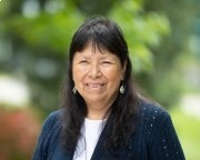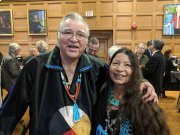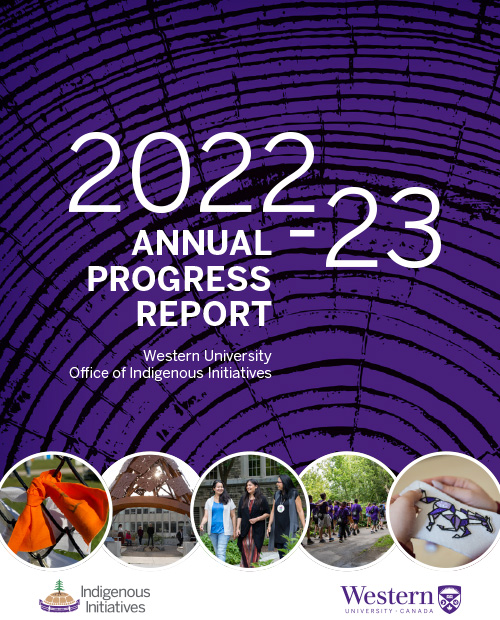Visiting Elders and Community Teachers
With an emphasis on actualizing Western’s Indigenous Strategic Plan (ISP, 2016) and implementing the Truth & Reconciliation Commission’s Calls to Action (TRC, 2015), the Office of Indigenous Initiatives (OII) is pleased to launch a Visiting Elders and Community Teachers Program available to all Western Faculties and Departments.
Western recognizes the significant role that Indigenous Elders and community members can play in the academic learning and research environment. Not only do Indigenous Elders and community teachers carry rights and responsibilities to hold, protect, and share Indigenous ways of knowing, they are held in high regard by Indigenous communities, and can bring important and often missing perspectives to university teaching, research, and service. Through this new program, Indigenous Elders and community teachers can be invited into the university to speak at conferences, participate in classrooms, and sit on committees including thesis examinations.
To help guide our work with communities, the Office has established a Guideline for Working with Indigenous Communities to assist Western members in working with Indigenous Peoples in respectful and reciprocal ways. The Guideline outlines commonly accepted cultural protocols for inviting, hosting, and appropriately recognizing Indigenous community members for their time and knowledge.
The Office of Indigenous Initiatives can support Western Faculties and Departments interested in bringing Indigenous Elders and Community into the university in two ways:
- Help identify, liaise with, and book Indigenous Elders and community members.
- Share costs and process payments for Elders and community members.
For more information about our program or guideline, contact Paula Hedgepeth at phedgepe@uwo.ca
Myrna Kicknosway
 Boozhoo, Aanii, Shekon, Greetings. My name is Myrna Kicknosway and I am from Walpole Island, Bkejwanong Territory. I have served as a Visiting Elder with Western University’s Indigenous Student Centre and Indigenous Postsecondary Education Council for more than 10 years. My life journey and personal healing offer me with an ever-expanding appreciation of Indigenous knowledges, traditions, and our capacity as human beings to grow and transform. I am available to meet one on one with individuals and work within groups to share Indigenous knowledge and teachings.
Boozhoo, Aanii, Shekon, Greetings. My name is Myrna Kicknosway and I am from Walpole Island, Bkejwanong Territory. I have served as a Visiting Elder with Western University’s Indigenous Student Centre and Indigenous Postsecondary Education Council for more than 10 years. My life journey and personal healing offer me with an ever-expanding appreciation of Indigenous knowledges, traditions, and our capacity as human beings to grow and transform. I am available to meet one on one with individuals and work within groups to share Indigenous knowledge and teachings.
Dan Smoke
 Dan Smoke is a member of the Seneca Nation. He is active in many areas of community life as a traditional knowledge carrier, community activist, and cultural teacher. Dan carries diverse teachings from many Indigenous Nations, which he shares to educate those who are willing to learn and listen.
Dan Smoke is a member of the Seneca Nation. He is active in many areas of community life as a traditional knowledge carrier, community activist, and cultural teacher. Dan carries diverse teachings from many Indigenous Nations, which he shares to educate those who are willing to learn and listen.
Dan has also served as a Cultural Counsellor and Visiting Elder with a number of colleges, universities, and agencies throughout Ontario, and as an Adjunct Professor at Western.
He has supported the development of cultural competency and ceremonial protocols to staff and faculty members, and has worked with public school boards over the past 14 years in many different capacities most notably working with youth. It is through Dan’s generous spirit, that he inspires everyone to believe in an inclusive community where new knowledge and understanding leads to healing, harmony and peaceful co-existence.
Mary Lou Smoke
Mary Lou Smoke is a member of the Ojibway Nation. She is a gifted writer, singer, guitarist and traditional drummer who generously shares her talents with her community. An exceptional individual, Mary Lou has worked tirelessly for many years in the City of London to bridge racial divides. She is committed to sharing Indigenous knowledge, histories, and culture to overcome barriers that lead to misunderstandings and cultural divides.
Mary Lou is a positive role model within both Indigenous and non-Indigenous communities, and has served as a Cultural Counsellor and Visiting Elder for a number of colleges, universities, and organizational service providers. She has also served as an Elder for local public school boards and helped develop cultural competency and ceremonial protocols that foster awareness and understanding across students, staff and administration.

